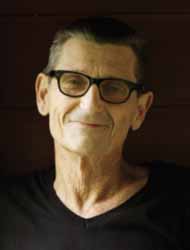 A lack of compassion from his care team helped drive Lee Tomlinson to despair and a suicidal state. Deep empathy and love from a physician friend helped bring him back.
A lack of compassion from his care team helped drive Lee Tomlinson to despair and a suicidal state. Deep empathy and love from a physician friend helped bring him back.
At TexMed 2020, the Los Angeles-based speaker and advocate will tell physicians why that word, “compassion,” is such a huge part of what patients need from their doctors. It’s also what physicians need to seek for themselves internally, he’ll explain in his upcoming keynote speech.
“It is about patients, but it really is at the same time equally about self-care, and providing oneself with the necessary compassion to be strong and healthy enough to be able to provide for their patients and colleagues. Because [colleagues are] in pain and suffering, too,” he told Texas Medicine. “If compassion is empathy for another’s pain, and an intense desire to do something to help relieve it, from a patient’s perspective, how you treat your colleagues is in large part a determinant of how they’re going to treat us.”
A former movie studio owner, TV producer, and professional tennis player, Mr. Tomlinson spent much of his early life getting to know hospitals and doctors well. Years of thrill-seeking had landed him in the hospital “infinitely since I was 5 years old and broke my first bone jumping off of the second-story landing of our house trying to prove I was Superman’s son.”
Most of the time, when he went to the hospital for repairs after another questionable daredevil quest, practitioners treated him with equal parts competence and humanity.
But after he was diagnosed with throat cancer about six years ago, and underwent the maximum amount of chemotherapy and radiation allowable, he encountered different and disturbing attitudes from his care team. At the end of his treatment, he was at “the absolute nadir of my existence,” living his life with the mentality of making it through 15-minute increments at a time.
“I was miserable. And if there ever was a time when I could’ve used a proverbial hug and a kiss from my health care professional, or two, it was then. And I got zero,” he said. “These [people] were the coldest, most robotic, most insensitive, unkind, rude – pick any word you like that’s a negative. … And in that weakened state of mind and body and soul, it crushed me. I thought, ‘If I’m fighting this hard, and these people don’t care a whit about me … you know what, they’re right. I am worthless. I am a pain in the butt to everybody. I need to get out of this life.’”
But as he’ll explain at TexMed, it was a physician friend who helped reverse that dangerous spiral. That physician held his arm, apologized for the compassion he hadn’t received, and gave him a sympathetic pep talk that gave him new purpose.
Inspired by that talk, Mr. Tomlinson successfully fought the disease and created the C.A.R.E. Effect Movement, which aims to reconnect health care professionals “with the compassion that got them into health care in the first place,” he said, and avoid the burnout that’s rampant in health care today.
His TexMed keynote, “The Naked Truth About Compassionate Care is Revealed – A Return to the Heart of Healing,” scheduled for 3:30 pm May 1 at the Fort Worth Convention Center, will define compassion and demonstrate methods and examples of how compassion can heal both patients and medical professionals.
“If there were a poster boy for burnout, it would be me, for all the bad stuff that happened,” Mr. Tomlinson said. “So I’m going to share why and I’m going to share how I went from suicidal – seriously suicidal – to healthy, happy, even joyous now.”
He says he wants his talk to be an expression of gratitude for what physicians do under “ridiculously difficult circumstances.”
“I want to express and have them deeply get how grateful I am to people just like them who have treated, cured, comforted me for my entire lifetime. … [T]he reason I am alive today, is people just like them.
“I want to speak for every patient they have ever treated, whether they’ve expressed it or not. I want those people to walk away knowing that what they do for us is a gift. The hardest gift in the world. You’ve got to be brilliant and have a big heart, and they do. I’m just there to remind them of it, and encourage them to be even more so.”
Tex Med. 2020;116(4):23
April 2020 Texas Medicine Contents
Texas Medicine Main Page